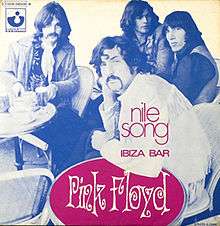The Nile Song
"The Nile Song" is the second song from Pink Floyd's 1969 album, More, the soundtrack to the film of the same name.[1][2] Released as a single in 1969 (only in France, Japan and New Zealand),[3] it was written by Roger Waters and sung by David Gilmour. It is similar to another song on the album, "Ibiza Bar". While the song was never performed live by Pink Floyd, the song was played by Nick Mason's Saucerful of Secrets in 2018.[4]
| "The Nile Song" | ||||
|---|---|---|---|---|
 | ||||
| Single by Pink Floyd | ||||
| from the album More | ||||
| B-side |
| |||
| Released | March 1969 | |||
| Recorded | February 1969 | |||
| Genre | ||||
| Length | 3:27 | |||
| Label | ||||
| Songwriter(s) | Roger Waters | |||
| Producer(s) | Pink Floyd | |||
| Pink Floyd singles chronology | ||||
| ||||
While the rest of the More album was issued in true stereo, "The Nile Song" was mixed in mono and processed into Duophonic stereo for release. A proper mono mix was eventually issued on the album's 2011 CD remaster.
Composition
Andy Kellman of AllMusic declared 'The Nile Song' to be "one of the heaviest songs the band ever recorded".[5] The chord progression is a series of modulations, beginning at A and then rising a whole step with each repeat, cycling through six different keys, returning to the starting point of A and continuing this pattern as the song fades out.[6] The song's style has been described as heavy metal,[7][8] acid rock[9] and hard rock.[10][11]
Personnel
- David Gilmour – lead vocals, guitar
- Roger Waters – bass
- Nick Mason – drums
Covers
"The Nile Song" was covered by:
- The Human Instinct, on their 1971 album Pins In It.[12]
- The Necros, on their 1986 album Tangled Up.[13]
- Red Temple Spirits, on their 1988 album Dancing to Restore an Eclipsed Moon.[14]
- The Melvins, live at UCLA in 1993.
- Panthers, on their 2004 album Things Are Strange.
- The Morlocks, on their 1991 album Wake Me When I'm Dead.[15]
- Voivod, on their 1993 album The Outer Limits.[16]
- Dreadnaught, on their 2001 EP One Piece Missing.[17]
- Gov't Mule, on their 2018 tour Dark Side of the Mule[18]
References
- Strong, Martin C. (2004). The Great Rock Discography (7th ed.). Edinburgh: Canongate Books. p. 1177. ISBN 1-84195-551-5.
- Mabbett, Andy (1995). The Complete Guide to the Music of Pink Floyd. London: Omnibus Press. ISBN 0-7119-4301-X.
- "The Official Site". Pink Floyd. Retrieved 2016-10-02.
- https://www.setlist.fm/setlist/nick-mason/2018/the-half-moon-london-england-3bed3048.html
- Kellman, Andy. Pink Floyd - Relics at AllMusic. Retrieved September 27, 2015.
- Pink Floyd: Anthology (1980 Warner Bros. Publications, Inc., Secaucus N.J.)
- Andy Mabbett (28 September 2010). Pink Floyd- The music and the mystery: The Music and the Mystery. Omnibus Press. p. 75. ISBN 978-0-85712-418-0.
- Pink Floyd- Uncensored on the Record. Coda Books Ltd. p. 37. ISBN 978-1-908538-27-7.
- Kopp, Bill (2018). Reinventing Pink Floyd: From Syd Barrett to the Dark Side of the Moon. Rowman & Littlefield. p. 72. ISBN 9781538108284.
- Mark Fogarty (14 August 2008). Went to See the Gypsy. Lulu.com. p. 293. ISBN 978-1-4357-5140-8.
- Riley Haas (13 September 2013). The Beatles Are the Greatest Rock Band of All Time and I Can Prove It. Riley Haas. p. 241. ISBN 978-0-9921513-0-0.
- "Human Instinct* - Pins In It". Discogs. Retrieved 8 August 2017.
- "The Necros* - Tangled Up". Discogs. Retrieved 8 August 2017.
- "Red Temple Spirits - Dancing To Restore An Eclipsed Moon". Discogs. Retrieved 8 August 2017.
- "Morlocks* - Wake Me When I'm Dead". Discogs. Retrieved 8 August 2017.
- "Voivod* - The Outer Limits". Discogs. Retrieved 8 August 2017.
- "Dreadnaught - One Piece Missing". Discogs. Retrieved 8 August 2017.
- "Gov't Mule Concert Setlist Jones Beach State Park, NY July 12, 2018".